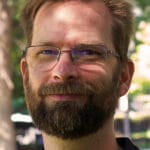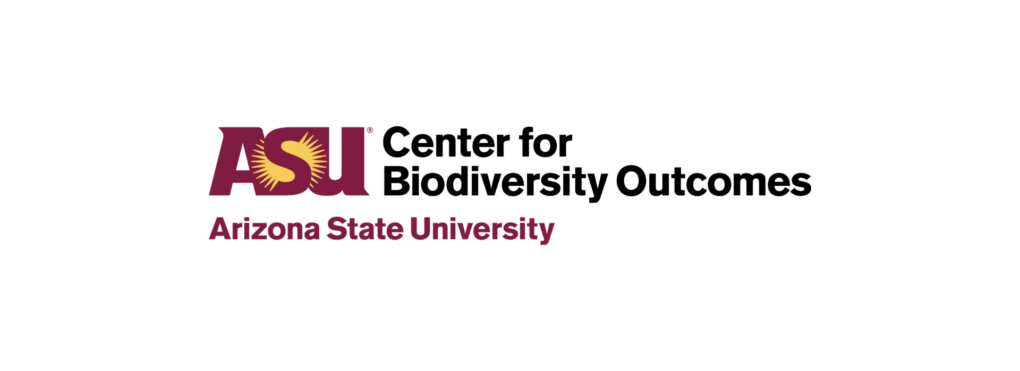Generating knowledge on what works in community engagement for biodiversity conservation.
The Conservation Solutions Lab was a collaborative initiative led by the ASU Center for Biodiversity Outcomes and Chemonics International. This initiative employed an evidence-driven interdisciplinary approach to bring knowledge of what works to conservation and development practitioners to advance effective and equitable engagement of communities in conservation programs. The lab’s network was formed by experts in the field of community-based conservation efforts who conduct research, produce knowledge, and implement solutions around the topic of community engagement in biodiversity conservation.
Highlights
Collaborative governance and co-management best practices
May 2021: On Tuesday, May 18, 2021, the Conservation Solutions Lab held a virtual member meeting for researchers and practitioners worldwide on the topic of “Collaborative Governance and Co-Management Best Practices.” This half day session included a range of presentations and discussions including community-based wildlife crime prevention, horizontal co-production of sustainability solutions, incorporating multiple knowledge systems into conservation solutions, and benefit sharing in REDD+. Dialogues melded research, theory, and practical experience with presentations from the Center for Biodiversity and Conservation at the American Museum of Natural History, One People One Reef, the Bonobo Conservation Initiative, the United Nations Office on Drugs and Crime, DAI, Chemonics and ASU. If you are interested in the CSL and future events, please contact the conservation solutions leadership team.
East Africa Conservation Solutions Lab meeting in Kenya
February 2020: Building on CSL discussions, and with the support of a number of CSL members, Chemonics and the Kenya Wildlife Conservancies Association (KWCA) organized a summit about moving from “community engagement” to community-led conservation solutions in Africa. Held 11-14 February 2020 at the Mt. Kenya Safari Lodge, Nanyuki, Kenya, the summit was designed to provide a forum for dialogue on the central role of communities to conservation success, their current challenges and impact, and to generate new ideas for the future of communities in driving sustainable conservation outcomes in East Africa and beyond. The summit report is being distributed to participants and will be available through the CSL websites on Chemonics and ASU sites (or by demand) as developed. In the meantime, this video provides a great synopsis of the event.
Rethinking conservation approaches in the age of COVID-19
August 2020: On August 31, 2020, members of the Conservation Solutions Lab published a commentary piece on Mongabay titled “Communities, conservation, and development in the age of COVID: Time for rethinking approaches.” In this article, the authors advocate for systemic, long-term solutions to existing biodiversity conservation and sustainable economic development challenges aggravated by the current pandemic.
New research from the Conservation Solutions Lab highlights conflicting views of frontline communities
September 2019: Are they essential leaders and drivers of conservation or threats to biodiversity? CSL researchers argue that conservation and development practitioners must confront this tension by engaging communities in solutions from the idea stage in this @Mongabay op-ed “From threat to solution: Rethinking the role of communities in nature conservation (commentary)” #GlobalGoals #SDG15
Conservation Solutions Leadership

Brian App
Director, Environment and Natural Resources, East and Southern Africa
Chemonics International
- [email protected]
- Chemonics International
1717 H St NW
Washington, DC 20006
Conservation Solutions operations
Arielle Berghammer-Zeigler
Senior Specialist, Innovation and Development Research, Chemonics International
Hailey Doughtery
Practice Specialist, Environment and Natural Resources, Chemonics International
Marvie Javed
Practice Specialist, Environment and Natural Resources, Chemonics International
Alejandro López Serrano
Senior Associate, Environment and Natural Resources, Chemonics International
Peggy Ochandarena
Director, Development Research, Chemonics International
Conservation Solutions former co-directors
Michael Brown
Consultant, Satya Development International, LLC
Samantha Cheng
Biodiversity Scientist, Center for Biodiversity and Conservation, American Museum of Natural History
Conservation Solutions members
Robin Abell
Freshwater Lead, Conservation International
Jonathan Adams
Author, Island Press
Rimjhim Aggarwal
Associate Professor, School of Sustainability, College of Global Futures
Beth Allgood
Founder and President, One Nature
Alejandro Arrivillaga
Chemonics International
Rajesh Buch
Business Development Director, Rob and Melani Walton Sustainability Solutions Service
Megha Budruk
Associate Professor, Parks and Recreation Program, School of Community Resources and Development
Nalini Chhetri
Clinical Professor, School for the Future of Innovation in Society and the School of Sustainability, College of Global Futures
Nicole Crane
Executive Director, One People One Reef
Felix Gaschick
Biodiversity and Forestry Specialist, Chemonics International
Leah Gerber
Founding Director, Center for Biodiversity Outcomes, Global Institute of Sustainability and Innovation
Marco Janssen
Professor, School of Sustainability, College of Global Futures
Jack Kittinger
Research Professor, School of Sustainability, College of Global Futures
Shauna Mahajan
Conservation Social Scientist, World Wildlife Fund
Emily Maistrellis
Public Health Researcher, Mailman School of Public Health, Columbia University
David Manuel-Navarrete
Associate Professor, School of Sustainability, College of Global Futures
Robin Martino
Deputy Chief of Party, Biodiversity Results and Integrated Development Gains Enhanced (BRIDGE) Project, DAI
Greg Minnick
Project Management Director, Latin America and the Caribbean Regional Business Unit, Chemonics International
Kina Murphy
Independent Consultant
Beth Polidoro
Associate Professor, School of Mathematical and Natural Sciences, New College of Interdisciplinary Arts and Sciences
Aireona Bonnie Raschke
Program Director, Central Arizona Conservation Alliance, Desert Botanical Garden
Melissa Rickman Boucher
Operations Director, Global Health Division, Chemonics International
Michael Schoon
Associate Professor, School of Sustainability, College of Global Futures
Nick Souter
Freshwater Senior Manager, Cambodia, Conservation International
Eleanor Sterling
Jaffe Cheif Conservation Scientist, Center for Biodiversity and Conservation, American Museum of Natural History
Jim Tolisano
Director of Innovations, Conservation LLC
Julie Viollaz
Editorial Board Member, Center for Problem-Oriented Policing, Watts College of Public Service and Community Solutions
Christine Vogt
Emeritus Professor, School of Community Resources and Development, Watts College of Public Service and Community Solutions
John Waugh
Vice President, Integra, LLC
Supin Wongbusarakum
University of Hawaii
Abigail York
Professor and Director of Graduate Studies, School of Human Evolution and Social Change, College of Liberal Arts and Sciences
Claire Zuazo
Director, Chemonics International
Partnerships

The Center for Biodiversity Outcomes
The mission of the Arizona State University Center for Biodiversity Outcomes is to enable the discoveries and solutions needed to sustain Earth’s biodiversity in a time of rapid biophysical, institutional and cultural change. The center draws on the innovative power of ASU to create path-breaking, practical solutions in biodiversity conservation by partnering with NGOs, corporations, governments and other academic institutions while training the next generation of conservation leaders.

Chemonics
Recognizing that development challenges are interrelated, Chemonics applies a “development first” approach to working in environment and natural resources management, focusing on strengthening markets, safeguarding natural capital and empowering marginalized groups. Chemonics’ development-centered approach can be seen in action across a broad array of landscapes, from rainforest communities to coastal cities, spanning more than 200 projects in natural resource management, biodiversity conservation, land tenure and property rights, environmental management and climate change adaptation and mitigation.
About
We are a collaborative initiative led by a unique partnership between the Center for Biodiversity Outcomes at Arizona State University and Chemonics International.
We bring together researchers and practitioners from multiple disciplines and sectors to generate and use the best available science to develop effective community engagement approaches for biodiversity conservation. Collectively, we define needs, share experience and knowledge, and refine and test solutions.
Our mission
Our mission is to bring evidence-based practice to designing, implementing and evaluating the impact of community engagement approaches in conservation.
Our approach
Our overarching approach is to synthesize and test approaches to effective and equitable community engagement in biodiversity conservation and natural resource management. We aim to elucidate trade-offs and synergies between socio-economic and ecological components of natural ecosystems under the community-based conservation model.
Connecting communities and conservation
Engaging communities is regarded as a critical component in biodiversity conservation and sustainable development. Despite the widely accepted idea that community engagement is essential to conservation success, the evidence for why specific engagement approaches are most effective in achieving long-term outcomes is unclear.
The methods for sufficient and successful engagement are not well understood either. Strengthening this evidence base will enhance our success on achieving durability in conservation initiatives, while reducing the risk of failed programs and negative consequences for people and ecosystems.
We are bringing together a range of multidisciplinary perspectives to pursue an evidence-based approach to conceptualizing and implementing effective and equitable community engagement that leads to measurable biodiversity conservation outcomes.
By synthesizing a global evidence base from published and grey literature, we will characterize the current state of knowledge of what we know about existing community engagement approaches and whether and how they work to achieve ecological and social outcomes.
We will use this evidence base to derive standardized and comprehensive frameworks of understanding of how engagement approaches are designed and used, build robust evidence-driven theories of change on how these approaches are thought to achieve outcomes in different contexts and test these theories with case studies with partner institutions and projects.
Our evidence-driven, collaborative approach represents a transformational approach to designing and implementing community engagement in global conservation outcomes.

